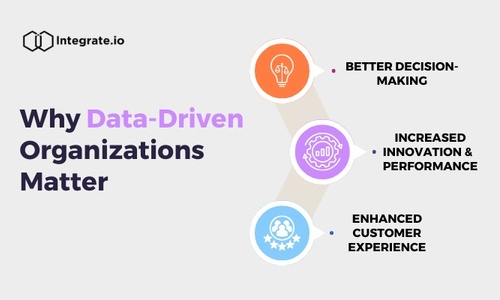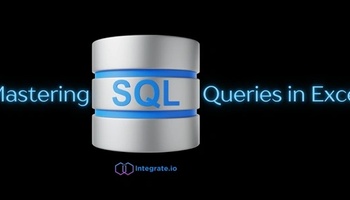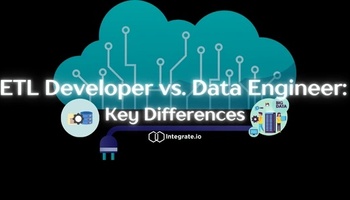Organizations that consistently use data for decision-making and improving operations outperform their competition.
McKinsey forecasts that companies leveraging data effectively can see up to 20% of their earnings before interest and taxes (EBIT) contributed by data-supported capabilities on the table. Therefore, prioritizing becoming a data-driven organization should be a key priority for all organizations. In this guide, we'll discuss why being data-driven matters and how you can take the next step.
But first, here are the key things you need to know about data-driven organizations:
- A data-driven organization uses data to make strategic decisions instead of relying on assumptions or gut feelings.
- A data-driven organization considers data to be an essential asset. They invest in technologies and expertise to obtain crucial data and integrate it.
- Organizations that use data effectively experience better decision-making, increased innovation, and enhanced customer experience.
- While managing large amounts of data can be daunting, you can do three simple things to start your organization's journey to becoming data-driven: integrate your data, establish clear KPIs, and visualize your data.
- Several tools and platforms available today can help your organization become more data-driven.
What Is a Data-Driven Organization?
So what does it mean to be a data driven organization? A data-driven organization makes strategic decisions based on data. Rather than relying on intuition, assumptions, or another "hunch," it uses data to inform its decision-making processes. It measures and analyzes every aspect of its operations to drive growth and identify areas for improvement.
You'll know an organization is data-driven when its obsession with facts and figures is palpable. Its business leaders use real-time data to optimize their operations and make crucial decisions.
A data-driven organization treats data as a valuable asset and invests in the technologies and expertise needed to acquire, store, and access it.
Furthermore, data-driven organizations must:
- Have access to reliable, high-quality data from various sources, such as customer feedback, market research, and sales figures
- Be proficient in data analysis, using specialized tools and techniques to extract insights and identify patterns
- Be able to integrate data into all aspects of its operations, breaking down silos between different departments and ensuring that everyone has access to the same information
- Be committed to ongoing learning and improvement—constantly analyzing data and identifying trends
Why Becoming a Data-Driven Organization Matters
Organizations that use data effectively gain a competitive advantage in their respective markets. Here are the key benefits of becoming a data-driven organization.
Better Decision-Making
Access to accurate and reliable data allows business leaders to confidently make informed decisions. Data takes away the guesswork in decision-making, minimizing bias and subjectivity to ensure hard evidence informs crucial decisions.
Increased Innovation and Business Performance
Data helps decision-makers identify patterns, trends, outliers, and opportunities that might not be obvious. Solid figures can uncover insights that lead to successful new products, services, and business models.
Data-driven insights also help companies identify areas that are underperforming and take informed steps to fix them.
Enhanced Customer Experience
Collecting data about customer behavior, preferences, and pain points enables organizations to tailor their offerings to those who matter most. Data-based organizations can build loyalty and drive revenue growth by providing a tailored customer experience.
For example, an Ecommerce site will likely enjoy repeat purchases when it uses data to personalize recommendations and offer targeted promotions based on previous purchases.
Data-Driven Organization Examples
Data has become the ultimate resource for companies to make insightful decisions and stay ahead of the competition. The following organizations have used data to their advantage.
1. Netflix
Netflix offers personalized recommendations based on viewer data. By gathering data on what its users watch, search for, and rate, Netflix has created a sophisticated algorithm that recommends content based on each user's individual taste.
The results? Viewers receive recommendations based on 80% of what they watch. This translates into more engaged customers and higher retention rates.
2. Amazon
Amazon offers product recommendations based on what customers have previously bought or searched for and provides tailored promotional offers and advertising. This approach has resulted in a significant boost in sales; Amazon reported a 9% net sales increase in Q1 2023.
3. Airbnb
Airbnb is famous for relying on data analytics to disrupt the hotel industry. Airbnb optimizes its pricing strategy based on user behavior on the platform. It enhances the user experience by providing customized search results and streamlined booking processes.
3 Tips for Becoming a Data-Driven Organization
While worth it, drawing actionable insights from large amounts of data can be daunting. Let's dive into three tips that can help you get started.
Integrate Your Disparate Data
Before you can become a data-driven organization, you must consolidate your disparate data in one place. ETL (extract, transform, load) processes and data integration tools can make this process easier and more streamlined.
Integrate.io handles even the most complex integrations in data analytics. It brings together data from a wide range of sources, transforms it as needed, and loads it into a variety of destinations, like data warehouses.
Establish Clear KPIs
Establishing clear Key Performance Indicators (KPIs) is essential because it gives an organization a way of measuring its performance against its defined goals.
For instance, tracking B2B ecommerce metrics such as conversion rate and customer acquisition cost (CAC) enables your business to focus on specific, measurable outcomes based on factual data—not just gut instincts.
Clear KPIs also provide a way for organizations to align their efforts with their overall mission and objectives. It helps them prioritize resources and communicate progress to internal and external stakeholders.
Make Data Easy to Visualize and Understand
Remember: Not everyone on your team is a data scientist. Be sure to present data that's easy to comprehend for the intended audience. Use data visualization tools like charts, graphs, and dashboards to simplify complex data sets.
Data visualization tools make it easier for decision-makers to identify trends and patterns at a glance. Data presented in a visual format can instantly show correlations and outliers, highlighting relationships and patterns that may be difficult to see in raw format.
Data-Driven Tools and Platforms
To become a data-driven organization, you must take advantage of tools and platforms to support data warehousing, integration, analytics, and visualization.
Data Warehousing Tools
Data warehousing tools store large volumes of data from multiple sources, enabling you to easily analyze and report on that data. This is essential for decision-making. Some popular data warehousing tools and resources include Amazon Redshift, Google BigQuery, Teradata, Snowflake, and Oracle.
Data Integration Tools
Data integration tools facilitate data collection, aggregation, and analysis from multiple sources. Some of the most popular data integration tools include Integrate.io, Talend, SAS Data Management, Oracle Data Integrator, Stitch, Fivetran, and Informatica PowerCenter.
Data integration tools enable companies to perform ETL (extract, transform, and load). The ETL process collects and combines data from multiple sources, such as online databases, social media, mobile applications, and web analytics tools.
Integrate.io simplifies ETL by providing a drag-and-drop interface, no-code operation, and integrations to over 200 apps and services. Through Integrate.io, you can consolidate all of your data quickly and simply.
Data Analytics Tools
Data analytics tools collect, process, and analyze large data sets to uncover insights and trends. Some popular data analytics tools include Apache Spark, SAP BusinessObjects, SPSS, RapidMiner, Oracle Analytics Cloud, and KNIME. These tools offer businesses a range of features, including data visualization, modeling, and predictive analytics.
Data Visualization Tools
Data visualization tools create visual representations of your data, making it easier to analyze and understand. From beginner-friendly options like Google Data Studio and Tableau to more advanced tools like Sisense and Datawrapper, there's a plethora that caters to various needs and skill levels.
Becoming Data-Driven With Integrate.io
Integrate.io offers a variety of data integration methods like ETL, reverse ETL, and fast Change Data Capture (CDC). With its ETL capabilities, you can extract, transform, and load data from various sources, including databases, APIs, and cloud platforms, into one central location.
Integrate.io's CDC feature ensures real-time data synchronization between systems, which is perfect for businesses that need up-to-date information and want to avoid manual data transfers between systems.
With Integrate.io, there's no need for lots of code or complex pipeline building. This makes it a fantastic tool for companies without data engineering experience or those who don't want to spend big bucks hiring expensive data engineers.
With Integrate.io's data observability, you can monitor your data in real-time. It allows you to quickly identify changes in your data and detect anomalies or errors, which is crucial for ensuring data accuracy.
Integrate Your Data Seamlessly With Integrate.io
As your business grows and expands, managing and integrating data from various sources becomes increasingly challenging. Integrate.io seamlessly integrates your data to provide you with valuable insights and better decision-making capabilities and you can easily become a data driven company.
Try Integrate.io for yourself. Sign up for a demo today and discover how Integrate.io can help you become a data-driven organization.










